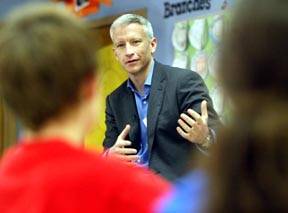Politics by Anderson Cooper

From 8/14/04 edition of USA Weekend
Why the conventions matter.
What unfolds onstage can have tremedous impact -- and intrigue.
I know, I know, in terms of drama, political conventions sure ain't
what they used to be. The bare-knuckle brawling and backroom deals
have given way to choreographed photo ops and tightly scripted
remarks.
But we should hardly dismiss the national conventions as banal
celebrations of the respective parties' primary campaign results.
Very human, and compelling, performaces are still played out, and
what unfolds onstage often has tremendous impact on the ultimate
outcome. That's why conventions still matter.
The first convention year I really remember is 1976, when the nation
met a former naval officer, Georgia governor and peanut farmer named
Jimmy Carter. He was able to convey such a sense of warm, genuine
humanity that we won over America and won the election. Next came
Ronald Reagan. The 1980 convention that paved the way for his
presidency electrified audiences with pageantry, and his personality
seemed to really come through.
We often see our presidents "grow up" under the convention
spotlight. Remember the 1988 Democratic convention, when a young
Arkansas governor named Bill Clinton stumbled through a tedious 32-
minute speech praising the nominee, Massachusetts Gov. Michael
Dukakis -- a much-criticized performance that damaged Clinton's
nation standing? (He had been allotted 15 minutes.) He quickly
recovered, going on The Tonight Show to make fun of himself. "I
wanted so badly to make Dukakis look great," Clinton confessed to
host Johnny Carson, "and I succeeded beyond my wildest dreams." He
rebounded in his effort to get the White House. And for years
later, at the convention where he nailed the nomination, he proved
he had learned his lesson with an eloquent, soulful speech, defining
himself as a compassionate Everyman. "I still believe in a place
called Hope..." he said, ambiguously referencing the place of his
birth, Hope, Ark.
Clinton's vice president, Al Gore, took note. At the 1996
convention in Chicago, he tried to define himself in very human
terms. He spoke poignantly about a sister who had died. Then, at
the 2000 convention in Los Angeles where he was nominated for
president, Gore had his old roomie from Harvard, Oscar-winning
Fugitive actor Tommy Lee Jones, come onstage to talk up the
candidate as a guy he'd take "chasing through the woods with coon
dogs in the middle of the night." (It sounded better on TV.)
This year, the drama and intrigue continue. Who is chosen to
speak? Who's snubbed? Who gets prime time? Who fumbles reading
the teleprompter? At the GOP convention, party moderators are
expected to take the stage, national heroes such as former New York
mayor Rudy Giuliani and U.S. Sen. John McCain.
Plenty of issues can unite voters or futher deepen the divide --
Iraq, terrorism, the economy and gay marriage, for starters. Will
the convention stars lay them out and let the chips fall? Or will
they play down the issues and hit human notes instead? I hate to be
a tease, but really, the only way to find out is to tune in.
-Anderson Cooper is host of Anderson Cooper 360, which airs at 7pm
ET. He'll cover the Republican National Convention later this month.
Side note: There is a pic included with the article, but I
unfortunately do not have the capability to scan. The caption
reads, "Plenty of issues can unite voters or further divide us --
the economy, gay marriage, Iraq. Don't miss the action, says CNN's
Anderson Cooper"
Article credit: USA Weekend





1 comentarios:
Who is the audience in the photo?
Post a Comment